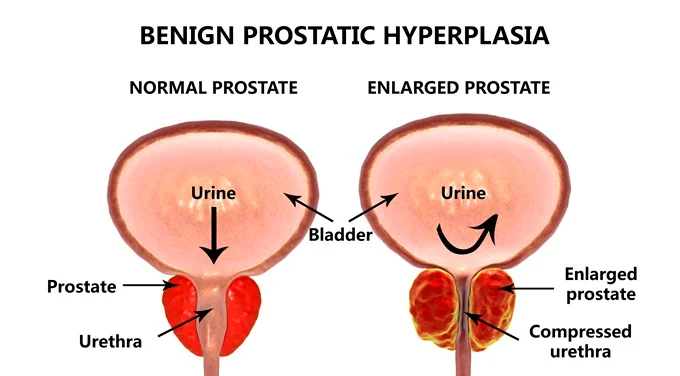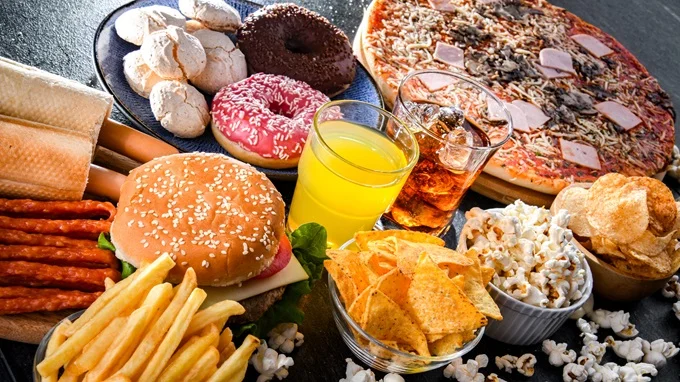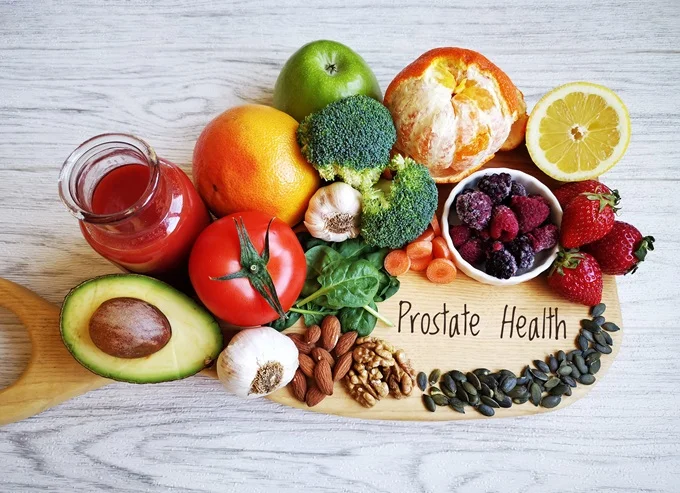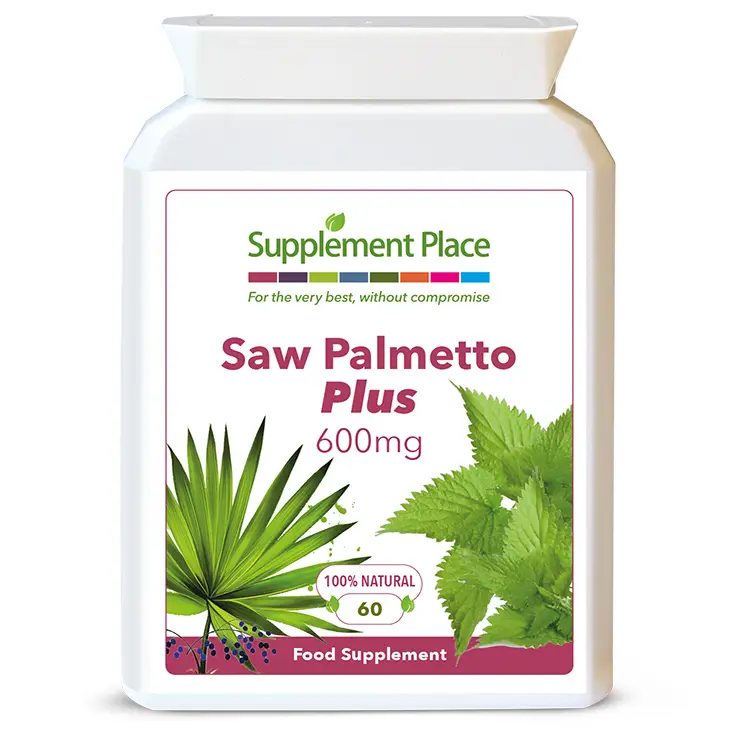Table of Contents
Ten Worst Foods for Prostate Health
We know that what we eat has a profound and direct effect on our health, our hormones, and particularly on our resistance to disease. It’s reassuring that medical research has found that choosing to eat a healthy diet can give protection from prostate issues such as inflammation, urinary problems, benign prostatic hyperplasia (BPH), and prostate cancer. In this blog we’ll highlight the foods that can put you most at risk as well as looking at the kind of diet that will give protection.
Understanding the Prostate
Just below the bladder, encircling the urethra which carries urine and semen out of the body, is a gland the size of a walnut. This gland is called the prostate, and it plays a crucial role in a man’s reproductive and urinary functions. Understanding how this vital gland works, and the issues that can arise with its functionality is key to helping it stay healthy and working well.
The prostate makes the liquid which carries semen and keeps sperm healthy. This is why the prostate gland is so important to a man’s fertility. Due to its position close to the bladder and urethra, any inflammation of the prostate can cause problems and discomfort with urination.
When things go wrong with the health of the prostate, symptoms causing pain and disruption to urination are often the result of inflammation known as prostatitis. This inflammation causes the prostate gland to swell, resulting in pain and problems with urinating. It may also sometimes cause a raised temperature or fever. Prostatitis is a very common condition particularly in later years, and it frequently results in a condition called benign prostatic hyperplasia (BPH). Symptoms include a frequent need to pee, a weak flow, and difficulty with completely emptying the bladder.

Prostate cancer is one of the most common cancers for men and it may have similar symptoms to BPH. This is why it is very important not to ignore the symptoms but to get your GP to arrange tests as soon as possible. Early detection and treatment are the key to a good outcome.
How Diet Affects the Health of the Prostate
Scientific research, in addition to finding cures for disease, now focusses much more on looking at health problems in a holistic way. Findings of many studies have verified that what you eat has a biochemical effect on the way your body works, and this applies very much to the healthy functioning of the prostate. Understanding how certain nutrients and carcinogens affect prostate health will enable you to make good decisions on which foods to eat and which to avoid.
A clinical review published in 2021 examines currently researched knowledge of the role of nutrients and dietary factors relating to prostate health. The review makes the point that an awareness of the beneficial and harmful effects of food is of great importance in the fight against prostate cancer.
Our immune system’s natural response to injury and infection is to produce inflammation to protect and heal the injury. It is when the inflammation becomes chronic that it can lead to certain diseases, and the prostate is one of those areas where prolonged inflammation can cause problems.
Antioxidants are molecules which neutralise free radicals from your body, and free radicals are compounds which are the by-products of metabolism. Due to the toxicity of free radicals, if they are not controlled, they can cause cell damage which could pose a risk of cancerous changes.
Your body’s own defence system will normally take care of controlling free radicals, but sometimes, due to various factors, including poor diet or other lifestyle issues and habits, your system may need some help. This is where plenty of antioxidant-rich foods in your diet will help. A diet that includes foods that provide anti-inflammatory and antioxidant benefits, such as berries, oily fish for omega 3, green vegetables – particularly cruciferous varieties such as broccoli and cauliflower, will reduce inflammation and help protect your prostate.
On the other hand, red and processed meats, charred meats, refined carbohydrates, saturated fats, too much salt, and heavy alcohol consumption, can make inflammation worse. Let’s explore the top ten worst foods for prostate health and the reasons why they can cause trouble.
The Ten Worst Foods For Prostate Health

1. Processed Meats
This is any meat which has had chemical preservatives added to make it keep for longer. These products may also have been smoked, cured and salted. Processed meats tend to have a high saturated fat content which causes inflammation, and they also tend to be high in salt. Excessive salt, or sodium in the diet leads to high blood pressure which can impact the blood supply to the prostate gland. Nitrites and nitrates are used in processed meat products as a preservative, but they promote harmful compounds in the body which have been linked to prostate cancer.
Examples of processed meats are:
- Sausage of all kinds including salami, chorizo, frankfurter (as in hot dogs), pepperoni, and polony (also known as bologna)
- Factory produced pork pie
- Factory cured ham
- Luncheon meat – sometimes called SPAM
- Corned beef
2. Red Meats
Research has found that excessive consumption of red meat, particularly when grilled, roasted or barbecued at high temperature, has been linked to a greater risk of prostate cancer. Cooking at high temperatures produces hydrocarbons which are carcinogenic.
Examples of fatty cuts of red meats to avoid or only have as a very occasional treat:
- Ribeye steak
- T-bone steak
- Belly pork
- Shoulder of lamb
It is recommended that cooked red meats be limited to 500 grams per week. Chicken and turkey is a better choice, but it’s a good idea to remove the skin as this contains a great deal of saturated fat.
3. High-Fat Dairy
High-fat dairy products have been linked with an increased risk of prostate cancer. It is thought that the combination of high levels of calcium and fat may promote the growth of prostate cells, but further studies are needed to verify these findings.
Examples of high-fat dairy:
- Full-fat milk
- Cream
- Butter
- Cheeses (other than lower fat versions such as Edam, cottage, ricotta, feta, mozzarella)
Some research studies have found that regularly eating high-fat dairy products can lead to a greater risk of enlarged prostate. If you drink a significant amount of full fat milk you might try switching to dairy-free alternatives such as soy, rice, almond or oat milk.
Current advice is that lower fat milk and other dairy foods are safer than full-fat versions.
4. Sugar
Hopefully everyone knows by now about the health risks of consuming too much sugar. One of the problems is that the manufacturers of processed foods are very adept at disguising its presence by calling it by a variety of different names on the packaging. Get into the habit of checking labels and look out for terms such as dextrose, fructose, galactose, glucose, lactose, maltose, and sucrose.
The sugar content in foods and drinks leads to various health problems including insulin resistance and obesity which are risk areas for prostate health. Research has found that sugar can also raise levels of the prostate-specific antigen (PSA) which is a marker used for prostate cancer screening.
Research carried out at the Johns Hopkins University found that men with pre-diabetes or type 2 diabetes who continued to consume sugar were particularly vulnerable to prostate complications.
Examples of high sugar products:
- Sweetened drinks such as alcoholic cocktails and mixers (tonic, soda and ginger ale), fruit squash, fizzy drinks such as cola and lemonade etc, flavoured teas and coffees, sports and energy drinks
- Packaged sweetened breakfast cereals
- Cakes, biscuits, pastries
- Milk chocolate and sweets
- Sweetened Desserts, including yogurts
5. Alcohol
Research has found that frequent and heavy consumption of alcohol is strongly linked to an increased risk of BPH as well as advanced prostate cancer. Because alcohol acts as a diuretic it can aggravate urinary tract symptoms causing bladder and prostate irritation, increased frequency and urgency in the need to urinate and incomplete bladder emptying.
Although there is evidence that an occasional glass of red wine may carry a degree of protection to the prostate due to its resveratrol content, it has been found that high alcohol intake and binge drinking is associated with increased risk of prostate cancer regardless of which type of wine or alcoholic beverage is chosen. It has also been found that alcohol may accelerate the growth of prostate tumours and lead to a worse prognosis for recovery.
6. Refined Carbohydrates
Foods which have been stripped of their fibre content are quickly digested, causing fast and significant rises in blood sugar levels. This results in the release of more and more insulin to cope with the amount of glucose in the bloodstream. When this happens regularly the body becomes insulin resistant resulting in chronic inflammation, oxidative stress, and an increased risk of prostate issues. It can also have an impact on hormonal balance, affecting testosterone levels which can lead to a stimulation in the growth of prostate cells.
Refined carbs are high in calories but low in fibre, vitamins and minerals. This is why they fail to sustain a feeling of fullness for long enough, signalling a need to eat more. Scientific research has established that refined carbohydrate foods, when consumed in regular and high amounts, can present a risk to prostate health.
A 2013 study found that a diet where Jamaican men were given a diet high in refined carbohydrate foods were put at greater risk of prostate problems than those given diets rich in vegetables, legumes, proteins and healthy fats.
Examples of foods which are classed as refined carbohydrates:
- White flour
- White bread
- Pasta
- White rice
- Baked goods such as cakes, muffins, biscuits, pastries
- Processed desserts and puddings
- Pies
- Packaged, sweetened breakfast cereals
- Sweetened drinks including beer, sweet wine and sherry
- Potato crisps
- Sweets and milk chocolate
7. Trans-Fats
Many processed foods contain liquid vegetable oils which have had hydrogen added to them to make them solid. This process has been used by mass food producers for a very long time to give their products a longer shelf life and to enhance taste and texture. Certain fatty acids, such as n-6 polyunsaturated fatty acid, found in trans fats have been linked to a higher risk of prostate cancer.
A 2021 review and meta-analysis examining the findings of 46 articles found significant links with trans fats and prostate cancer.
Examples of foods containing trans fats:
- Partially hydrogenated oils which are used in many processed foods are the main source of laboratory-produced trans fats. They are to be found in processed goods such as biscuits, cakes, and pastries
- Fast food outlets often use cooking oils with trans fats for deep frying their products such as French fries, battered and breaded fish, chips, chicken nuggets, onion rings etc
- Snacks which are pre-cooked and packaged such as crisps, and popcorn are mostly produced with the use of trans fats
- Baked products such as supermarket pre-packaged sausage rolls, pasties, pies, doughnuts and other pastry-based foods often contain trans fats
8. Caffeine
The NHS gives guidelines on caffeine consumption to help you protect the health of your prostate. As caffeine is a diuretic, excessive intake can over-stimulate the bladder, causing discomfort and an increased need to urinate. It can raise testosterone and DHT levels, potentially affecting prostate health. Too much caffeine may aggravate the symptoms of BPH.
However, certain studies report that drinking black coffee may possibly have protective effects on the risk of Prostate Cancer.
Examples of caffeinated foods and drinks:
- Coffee
- Energy/sports drinks
- High-caffeine teas
- Energy bars
- Painkillers – check labels as some over-the-counter painkillers have added caffeine
9. Salt
Too much salt in the diet has various negative effects on prostate health. It can lead to high blood pressure, and this can affect blood flow. It can also cause inflammation within the body, including the prostate.
Laboratory studies have concluded that consuming too much salt puts extra strain on the kidneys so the filtering of waste from the body and the balance of electrolytes is compromised, leading to an increased risk of prostate problems, along with other metabolic health issues.
Examples of too much salt in the diet:
- Salt is often added to food during the cooking process
- Fast food such as burgers, chips, fried chicken are usually high in salt
- Processed foods such as tinned soups, sauces, pre-packaged ready meals
- Snack foods such as potato crisps, and salted nuts
- Sauces such as tomato ketchup, soy sauce, salad cream
10. Artificial Sweeteners
Research has linked the use of artificial sweeteners with possible prostate health issues. The effects include changes to the balance of hormones and variance in testosterone levels could possibly affect prostate health. Although artificial sweeteners are used as sugar substitutes there is some proof that consuming artificial sweeteners can promote metabolic changes such as insulin resistance and glucose intolerance. As well as impacting general health, these problems can also have a negative effect on prostate health.
Examples of artificial sweeteners found in drinks, desserts, ready meals, cakes, chewing gum and toothpaste:
- Acesulfame (E950)
- Aspartame (E951
- Sucralose (E955)
- Saccharin (E954)
- Erythritol (E968)
- Sorbitol (E420)
- Steviol glycosides (E960)
- Xylitol (E967)
Foods to Protect Prostate Health

Certain foods have been found to be beneficial to prostate health. Eating foods high in antioxidants such as fruits and vegetables gives protection against cell damage so may reduce the risk of prostate problems. The main antioxidants known to be good for prostate health are Vitamins C and E, selenium and lycopene. However, it has been found that excessive supplementation with vitamin E can cause a risk factor, so it is important to consult your doctor before including vitamin E supplements in your diet.
It’s good to know that there are a huge number of delicious foods which are highly beneficial to prostate health. When you visualise the kind of diet for awarding yourself the best chance of avoiding prostate problems you should think of an array of the brightest coloured foods you can find. When you choose vibrant coloured wholefoods, you will automatically be gaining a huge boost of antioxidants, and this will give you loads of protection from many diseases, including prostate issues.
Tomatoes (Lycopene)
Tomatoes are one of the very few foods which give greater nutritional protection in terms of prostate health when they are cooked or processed than when eaten fresh. This is because tomatoes are rich in an organic compound called lycopene which gives them their bright red colour.
Lycopene is an antioxidant carotenoid which lowers blood levels of antigen, a protein which causes inflammation and enlargement of the prostate. Studies have found that processing breaks down the cell matrix in tomatoes and makes the lycopene more easily absorbed by the body.
Due to its protective effect on cells, a high intake of lycopene-rich foods has been found to bring down the risk of prostate cancer. Cooking tomatoes to make them into a puree or tomato sauce significantly increases the level of bioavailability in the body.
Fruits
Berries are a superb choice with blackberries, strawberries, raspberries, and blueberries being a great source of support for your body’s antioxidant defence system.
Stone fruits such as plums, peaches, nectarines, and apricots are also healthy choices as they are full of fibre and vitamins as are apples, and citrus fruits.
Vegetables
Plenty of fresh vegetables in your diet, especially green leafy varieties and cruciferous vegetables such as broccoli are excellent choices both in terms of vitamins, antioxidants and dietary fibre, all of which are vital components of a healthy and prostate protective diet.
Dietary Fibre
The kind of fibre found in healthy wholefoods such as vegetables, fruit, legumes and beans help digestion and weight control. A high fibre diet makes you feel full and keeps blood sugar levels stable. This all helps with reducing inflammation so is great for prostate health. Beans and lentils are great additions to your diet for both protein and extra fibre.
Healthy Fats
For many years all fats have been maligned and labelled as unhealthy. However, we now know for sure that our bodies need certain fats to function properly. Fats which are good for keeping hormones balanced are known as monounsaturated and polyunsaturated fats which are found in extra virgin olive oil, avocados, nuts, seeds, oily fish such as wild salmon, mackerel, sardines, and tuna. These are all highly anti-inflammatory.
Consuming a regular supply of omega-3 fatty acids which is found in oily fish as well as in certain plant-based sources has been linked to a lowered risk of prostate cancer.
Green Tea
Compounds in green tea known as catechins help control secretion of DHT and PSA, protecting from a risk of enlarged prostate and reducing the frequent need to pee, although green tea does contain caffeine so should be consumed in moderation.
Water
If you are not already in the habit of drinking lots of water, it’s a great help in eliminating toxins and irritants from foods such as spices which may cause prostate inflammation.
Additional Information
Here are a few extra facts that may help when you re-evaluate your diet to give yourself extra prostate protection:
- Grass-fed organic meats are the healthiest choice.
- Choose free-range and/or organic chicken and fish.
- Consuming an excess of high-calcium foods can result in the growth of prostate tumours, particularly if you already have prostate cancer.
- Excessive intake of choline has been linked to an increased risk of prostate problems. Choline is found in meat, fish, dairy and eggs.
- Smoked and cured meats may contain high levels of sodium and preservatives which are potentially carcinogenic.
- Consider switching a few meat meals each week for a vegetarian option.
Natural Supplements to Help Prostate Health
To ensure you are giving yourself the maximum nutritional protection these supplements are excellent when used alongside prostate-friendly foods but should not be considered a substitute for a healthy wholefood diet.
Saw Palmetto Plus is our go-to product for prostate health. It contains Saw Palmetto, Lycopene and Stinging Nettle Root Extract.
Zinc (Wholefood from Guava Leaf) containing super antioxidants such as Quercetin, Lycopene and Beta-Carotene, as well as polyphenols, tannins and flavonoids.
Omega 3 (Vegan) Sourced from a freshwater algae. Giving an alternative way to get this essential fatty acid without the use of fish oil or dairy.
Trans Resveratrol + Quercetin Highly powerful duo of antioxidants to help in the fight against inflammation.
Conclusion
To give yourself the best chance of keeping your prostate health in good order a wholefood diet is key. Here is a summary of the main things you need to know:
- Aim to eat plenty of vegetables, fruit, organic white meat and fish
- When choosing salmon and trout look for wild rather than farmed
- Introduce more plant-based proteins such as pulses, legumes and unsalted nuts
- Keep alcohol to an occasional treat and learn to live without white flour, sugar, and high fat dairy in your diet
- Limit caffeine, consider switching to decaffeinated coffee
- Drink plenty of water
These few changes, although they may take a few weeks of adjustment, will seriously help your general health, keep your level of body fat in a safe range and give maximum protection to your prostate.
Further Reading on Prostate Health
Our Promise
When it comes to keeping you informed on health and nutrition, we’re here for you and aim to help where we can. If you would like to discuss any aspect of using natural supplements, or would find advice helpful, please feel free to contact us on 01297 553932
Always very efficient. Packages are able to come through the letter box which is a bonus. Particularly appreciate the vegan omega 3.
Over several years now they have always delivered me quality products prompty. I can recommend Supplement Place without hesitation.
Excellent service. I love the thin storage friendly containers that take up minimal space in my cupboard. Such a brilliant idea!! ?


